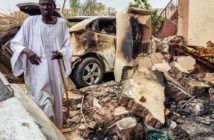 Bashar al-Assad et le régime syrien sont-ils en train de gagner la partie d’échecs engagée il y a bientôt cinq ans sous le soleil du Sham ? Reste-t-il encore quelque chose à prendre en compte de l’Armée syrienne libre et de la révolution en Syrie ? L’État islamique a-t-il déjà perdu la guerre ? Et quelle partition les factions kurdes vont-elles jouer dans ce concert devenu un peu plus lisible ?
Bashar al-Assad et le régime syrien sont-ils en train de gagner la partie d’échecs engagée il y a bientôt cinq ans sous le soleil du Sham ? Reste-t-il encore quelque chose à prendre en compte de l’Armée syrienne libre et de la révolution en Syrie ? L’État islamique a-t-il déjà perdu la guerre ? Et quelle partition les factions kurdes vont-elles jouer dans ce concert devenu un peu plus lisible ?
La face du théâtre change… L’Occident a perdu l’initiative et la presse européenne a beau accentuer de toutes les manières son « Poutin-bashing » (devenu obsessionnel depuis la réémergence de la guerre froide soudainement ressurgie à la faveur de la crise en Ukraine) et répéter que « plus d’un millier de civils ont été tués dans les frappes russes en Syrie… selon l’OSDH » (l’Observatoire syrien des Droits de l’Homme, une nébuleuse d’officines qui avaient inondé les médias de bobards dès le début du conflit, « source » plus que douteuse citée et re-citée à l’envi par des journaleux d’une incompétence crasse et que l’on croyait remisée au hangar des « tout le monde peut se tromper », mais qui revient aujourd’hui dans les éditoriaux comme une plaie), il n’empêche que la politique de Moscou porte ses fruits et permet à l’armée régulière syrienne de s’imposer presque partout, et même face à l’État islamique.
L’armée régulière syrienne est en effet à Moscou ce qu’il manque à la Coalition internationale menée par les États-Unis : une force d’intervention au sol, bien équipée et déterminée, capable de coordonner son action avec l’appui aérien massif d’alliés dont les frappes, seules, ne suffisent pas à anéantir les brigades djihadistes qu’elles parviennent péniblement à contenir, voire à faire reculer de quelques kilomètres là où, mal implantées, elles peuvent être repoussées par des milices locales.
Parfaitement en phase l’une avec l’autre, l’armée syrienne et l’aviation russe ont ainsi obtenu des résultats probants depuis le lancement des opérations, fin décembre 2015 : les régions de Latakieh, d’Idlib et, à présent, d’Alep, sont progressivement reconquises, les unes après les autres, par le régime qui, peu à peu, reprend le contrôle du pays.
Si les frappes russes sur tous les opposants à Bashar al-Assad (et pas seulement sur l’État islamique) affaiblissent la résistance aux djihadistes (puisque l’opposition syrienne se bat aussi contre l’EI), en débarrassant l’armée régulière syrienne de combats secondaires qui la distraient d’objectifs majeurs et mobilisent des effectifs, ces frappes permettent cependant la reconfiguration d’un front terrestre efficace contre « Daesh ».
 Are Bashar al-Assad and the Syrian regime winning the game of chess that began nearly five years ago under the sun of the Sham? Is there still something to expect from the Free Syrian Army and the Syrian revolution? Has the Islamic State already lost the war? And which part will the Kurdish factions play in the concert that has become a bit less cacophonic?
Are Bashar al-Assad and the Syrian regime winning the game of chess that began nearly five years ago under the sun of the Sham? Is there still something to expect from the Free Syrian Army and the Syrian revolution? Has the Islamic State already lost the war? And which part will the Kurdish factions play in the concert that has become a bit less cacophonic?
The façade of the theatre has changed… The West has lost the initiative and the European press may try to keep up its “Putin-bashing”, which has become an obsession since the re-emergence of the cold war with the Ukraine crisis. It can repeat that “more than a thousand civilians have been killed by Russian strikes in Syria… according to the SOHR” (the Syrian Observatory of Human Rights, a misty organisation that had drowned the media with fabricated lies since the beginning of the conflict, nonetheless cited again and again by the incompetent journalistic mob, a more than doubtful “source” that seemed to have been pushed back into the hangar of “everyone can make mistakes”, but that is coming back to editorials today like a pest). Even this journalism cannot stop Moscow’s policy from bearing its fruit and the regular Syrian army from imposing itself nearly everywhere, even against the Islamic State.
The regular Syrian army is for Moscow what the International Coalition led by the USA is lacking: an on-site intervention force, well-equipped and determined, able to coordinate action with massive aerial support. The air strikes on their own do not suffice to dismantle and destroy the Jihadist brigades, but just about to bring them to a hold or perhaps push them back for a few miles, from where they can be pushed further back by local militia.
Perfectly aligned, one with the other, the Syrian army and the Russian air force have obtained convincing results since the launch of operations at the end of December 2015: the regions of Latakiah, of Idlib, now even of Aleppo, are one after the other progressively reconquered by the regime, which slowly but seemingly surely regains its control over the country.
If the Russian air strikes against all enemies of Bashar al-Assad (and not only against the Islamic State) weaken the resistance to Jihadists (since the Syrian opposition also fights against the IS), by ridding the regular Syrian army of secondary combats that distract it from major objectives and require troops, these air strikes allow the reconfiguration of the ground frontline to be more efficient against “Daesh”.
 هل بشار الأسد ونظامه في طريقهم للفوز بمباراة الشطرنج التي بدأت منذ ما يقارب الخمس سنوات تحت شمس الشام ؟ وهل يبقى شيء لنأخذه في الحسبان فيما يتعلق بالجيش السوري الحر والثورة في سورية ؟ وهل خسرت داعش الحرب ؟ وما هو الدور الذي ستلعبه الأحزاب الكردية في هذه الجوقة التي أصبحت أكثر وضوحاً ؟
هل بشار الأسد ونظامه في طريقهم للفوز بمباراة الشطرنج التي بدأت منذ ما يقارب الخمس سنوات تحت شمس الشام ؟ وهل يبقى شيء لنأخذه في الحسبان فيما يتعلق بالجيش السوري الحر والثورة في سورية ؟ وهل خسرت داعش الحرب ؟ وما هو الدور الذي ستلعبه الأحزاب الكردية في هذه الجوقة التي أصبحت أكثر وضوحاً ؟
لقد تغيرت واجهة المسرح … الغرب فقد المبادرة والصحافة الأوربية وصل انشغالها بالرئيس الروسي فلاديمير بوتين حد الهوس منذ عودة الحرب الباردة التي برزت فجأة بعد الأزمة في أوكرانيا، كما كررت تلك الصحافة أن أكثر من ألف مدني سقطوا جراء القصف الروسي في سوريا حسب المرصد السوري لحقوق الإنسان (هذه الجهة الدعائية المشبوهة التي أغرقت وسائل الإعلام بالأكاذيب منذ بداية الصراع، إنها» مصدر « مشكوك فيه يستند إليه بعض الصحفيين الحمقى حسب حاجتهم وبمهنية سيئة وخبيثة، استناداً اعتقدنا أنه مبررٌ لأنه لا أحد معصوم عن الخطأ ، لكن سوء استخدام المهنة هذا يعود اليوم ويظهر كجرح في العمل الصحفي)، لكن هذا لا يمنع أن السياسة الروسية تؤتي ثمارها وتسمح للجيش السوري النظامي بإعادة فرض نفسه في كل مكان تقريباً وحتى في مواجهة تنظيم الدولة الإسلامية
بالنسبة لموسكو، ما ينقص التحالف الدولي الذي تقوده الولايات المتحدة هو الجيش السوري النظامي : قوة تدخل على الأرض مجهزة بشكل جيد ومصممة وقادرة على تنسيق عملها مع الدعم الجوي المكثف للحلفاء، لأن الضربات الجوية وحدها لا تكفي لهزيمة الكتائب الجهادية حيث القصف الجوي يتمكن وبصعوبة من احتوائها، لا بل دفعها إلى التقهقر لمسافة كيلو مترات عدة أو إخراجها من قبل الميليشيات المحلية من المناطق التي لا تتمنع فيها ببيئة حاضنة
بتناغم كامل بينهما استطاع كل من الجيش السوري والطيران الروسي تحقيق نتائج جيدة منذ بداية العمليات في تشرين الأول من العام الماضي حيث استعاد النظام السوري تدريجياً مناطق في اللاذقية وإدلب وحلب حالياً مما سيمكنه من إعادة السيطرة على البلاد شيئاً فشيئاً
الفرضية المدعومة من مراقبين عديدين متسمين باللياقة السياسية تبدو غير صحيحة ، فبحسبها الضربات الجوية الروسية ضد معارضي بشار الأسد (وليس فقط ضد تنظيم الدولة الإسلامية) سوف تضعف المقاومة ضد الجهاديين (حيث المعارضة السورية تقاتل ضد داعش أيضاً). هذه الفرضية تبدو بدون أساس فبتخليص الجيش النظامي السوري من المعارك الثانوية التي تحرف انتباهه عن الأهداف الرئيسية وتدفعه لزَج إمكاناته فيها، ستسمح الضربات الروسية بإعادة تشكيل جبهة برية فعالة ضد داعش



